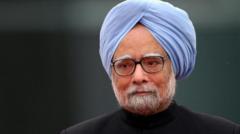Manmohan Singh, who served as Prime Minister from 2004 to 2014, played a pivotal role in India's transformative economic reforms and is remembered for his calm demeanor and integrity.
Legacy of Leadership: Remembering Manmohan Singh, India's Architect of Economic Reform

Legacy of Leadership: Remembering Manmohan Singh, India's Architect of Economic Reform
Former Indian Prime Minister Manmohan Singh has passed away at 92, leaving a profound impact on the nation's economy and politics.
Born on September 26, 1932, in Gah, Punjab, Manmohan Singh rose to prominence as the Finance Minister in 1991 when he championed liberalization strategies that rescued India from economic turmoil. His vision catalyzed major macroeconomic reforms, spurring growth, privatizing state-run enterprises, and attracting foreign investment.
Singh's era as Prime Minister was not without challenges. Although he secured India's place on the nuclear stage through a significant deal with the U.S., his second term was marred by allegations of corruption within his administration, contributing to the disillusionment of voters and the Congress party's defeat in the 2014 elections.
Despite his achievements, Singh often described himself as an "accidental prime minister," emphasizing his lack of political ambition and relying heavily on leadership of Sonia Gandhi. Nevertheless, his intellectual prowess earned him respect domestically and internationally, including efforts to stabilize relations with neighboring Pakistan and China.
A low-profile leader, Singh's reserved approach stood in stark contrast to the more vocal political figures around him. He remained a significant voice in the Congress party even after his tenure, advocating for policies addressing economic disparities, particularly during the COVID-19 crisis.
Singh is survived by his wife and three daughters, and his legacy is expected to influence India's socio-economic policies for years to come. History will look at his contributions through a nuanced lens, acknowledging both his accomplishments in elevating India’s global standing and the controversies that marked his political journey.
Singh's era as Prime Minister was not without challenges. Although he secured India's place on the nuclear stage through a significant deal with the U.S., his second term was marred by allegations of corruption within his administration, contributing to the disillusionment of voters and the Congress party's defeat in the 2014 elections.
Despite his achievements, Singh often described himself as an "accidental prime minister," emphasizing his lack of political ambition and relying heavily on leadership of Sonia Gandhi. Nevertheless, his intellectual prowess earned him respect domestically and internationally, including efforts to stabilize relations with neighboring Pakistan and China.
A low-profile leader, Singh's reserved approach stood in stark contrast to the more vocal political figures around him. He remained a significant voice in the Congress party even after his tenure, advocating for policies addressing economic disparities, particularly during the COVID-19 crisis.
Singh is survived by his wife and three daughters, and his legacy is expected to influence India's socio-economic policies for years to come. History will look at his contributions through a nuanced lens, acknowledging both his accomplishments in elevating India’s global standing and the controversies that marked his political journey.


















